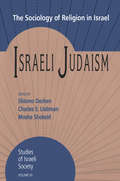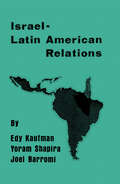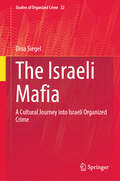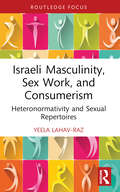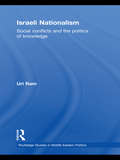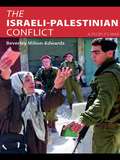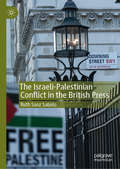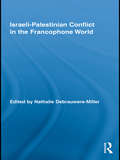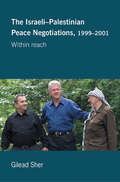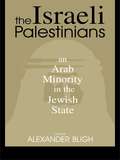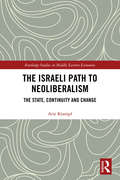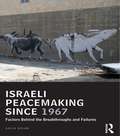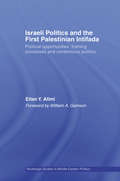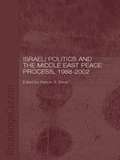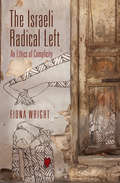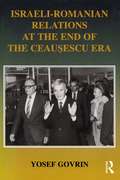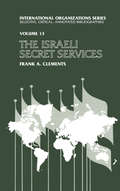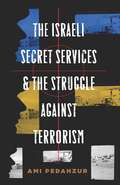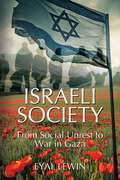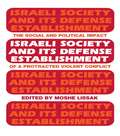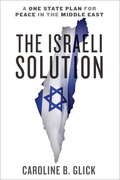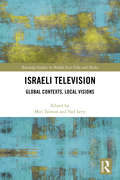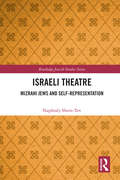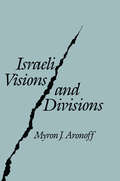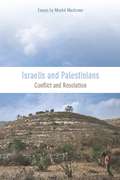- Table View
- List View
Israeli Judaism: The Sociology of Religion in Israel (Studies Of Israeli Society Ser. #Vol. 7)
by Shlomo Deshen Charles S. Liebman Moshe ShokeidThis is an unusual and extremely timely collective effort. It appears at a moment in which Israelis not only must confront their Arab neighbors, but must deal with one another as Jews possessing radically different views on the present and future of the Jewish tradition. With this seventh volume of the series, the Israeli Sociological Society has turned its attention to religion, an area that for many years has been of high importance, but low profile in Israeli affairs and in the wider Middle Eastern context. Chapters and contributors include: "Jewish Civilization: Approaches to Problems of Israeli Society" by Shmuel N. Eisenstadt; "Life Tradition and Book Tradition in the Development of Ultraorthodox Judaism" by Menachem Friedman; "Religious Kibbutzim: Judaism and Modernization" by Aryei Fishman; "The Religion of Elderly Oriental Jewish Women" by Susan Sered; and "Hanukkah and the Myth of the Maccabees in Ideology and in Society" by Eliezer Don-Yehiya. The increasing presence of religious activism in contemporary Israel, side by side with subtle changes in the religion of Israeli Sephardim, makes the topic of religion essential for an understanding of Israel—and much of the Middle East generally. Israeli Judaism is a significant work, and will be of interest to theologians, philosophers, sociologists, anthropologists, and political theorists.
Israeli-Latin American Relations
by Edy KaufmanEdy Kaufman, Department of International Relations, Hebrew University of Jerusalem; Yoram Shapiro, Latin American Studies Department, Hebrew University of Jerusalem; Joe] Barromi, Director, UN Department of the Ministry for Foreign Affairs, IsraelInteraction with Latin America has held varying degrees of importance in Israel's foreign relations. This study aims to present a comprehensive analysis of the patterns of continuity and change in Israel's relations with Latin America over a twenty-five year period, from the creation of the state to the 1973 October War,The authors provide a factual survey of major developments in Israeli-Latin American relations since 1948 - and evaluate the attitudes of Latin American decision makers toward Israel. This latter evaluation is accomplished by studying patterns of behavior, grouping nations according to levels of support for Israel, and analyzing the influence of different variables on the policymaking process both for each of the states involved and their interaction.The work is divided into two basic units: background inputs and analysis of international and state relations. This division is utilized as the basis for the outputs of data and analysis on a multilateral as well as bilateral level, culminating in a detailed analysis of Latin American voting in the United Nations General Assembly.Quite distinctive in subject and perspective. It is timely in its relevance to the Middle East conflict and the recent bid by Latin American Jead-ers for greater influence in Third World politics.
The Israeli Mafia: A Cultural Journey into Israeli Organized Crime (Studies of Organized Crime #22)
by Dina SiegelThis book delves into a previously unexplored realm within criminological scholarship: Israeli organized crime. Breaking the silence that has shrouded this topic, this book undertakes a comprehensive examination of the intricate socio-economic and cultural landscapes that have shaped the criminal operations of a diverse array of Jewish and non-Jewish criminal entities, spanning from the inception of the Israeli state to the present day in 2024. Drawing upon meticulous ethnographic fieldwork conducted in Israel between 2020 and 2024, alongside rigorous media analysis, interviews conducted both domestically and internationally, and a wealth of visual material captured by the author during fieldwork, this study offers unparalleled insights into the dynamics of Israel's underworld. It examines the multifaceted activities of various criminal organizations, including but not limited to drug and human trafficking, protection rackets, gambling enterprises, and contract killings. Moreover, this book critically examines the responses of authorities and law enforcement agencies to the escalating influence of organized crime amidst the backdrop of major socio-political upheavals in Israel, ranging from wars and waves of immigration to terrorist attacks. By contextualizing these criminal phenomena within broader historical and contemporary narratives, this work not only fills a significant gap in scholarly discourse but also provides a nuanced understanding of the intersections between crime, society, and governance in the Israeli context.
Israeli Masculinity, Sex Work, and Consumerism: Heteronormativity and Sexual Repertoires (Focus on Global Gender and Sexuality)
by Yeela Lahav-RazIsraeli Masculinity, Sex Work, and Consumerism: Heteronormativity and Sexual Repertoires explores the inner world of Israeli sex work consumers and their use of digital technologies on which intense feelings of social togetherness and belonging create a localized form of homosociality and brotherhood. The first of its kind to offer an in-depth analysis of masculine sexual repertoires in the field of sex consumption, this book uses extensive data and observations of online ethnography among a community of Israeli sex consumers operating online. It elucidates the economics of demand in the field of sexual consumption and highlights how the rise of the thriving online communities of sex consumers can function as a platform on which power relations between men themselves are publicly displayed and are constantly challenged. Israeli Masculinity, Sex Work, and Consumerism: Heteronormativity and Sexual Repertoires will be suitable for researchers in Gender and Sexuality Studies, Sociology, Anthropology and Criminology.
Israeli Nationalism: Social conflicts and the politics of knowledge (Routledge Studies in Middle Eastern Politics)
by Uri RamThe question of nationalism centres around the political, social, and cultural ways by which the concept and practice of a nation is constructed, and what it means to its various bearers. This book examines the issue of Jewish-Israeli nationalism, combining a sociological study of national culture with a detailed analysis of Israeli national discourse. Taking an interdisciplinary approach, the author explores the categories of thought that constitute the Jewish-Israeli "nation" as an historical entity, as a social reality and as a communal identity. Unravelling the ways in which Israeli nationhood, society and identity had been assumed as immutable, monolithic and closely bound objects by Zionist ideology and scholarship, he then explores how in modern times such approaches have become subject to an array of critical discourses, both in the academic disciplines of history, sociology and cultural studies, and also in the wider sphere of Israeli identity discourse. This unique study of the issue of Jewish-Israeli nationalism will be of great interest to students and scholars of Israeli Studies, Middle East Studies and Jewish History, as well as those working in the fields of Sociology, Political Science, History and Cultural Studies with an interest in nationalism, citizenship, social theory and historiography.
The Israeli-Palestinian Conflict: A People's War
by Beverley Milton-EdwardsThe conflict between Israelis and Palestinians is one of the most enduring and complex in the modern world. But, why did the conflict break out? Who is demanding what, and why is peace so difficult to achieve? The Israeli-Palestinian Conflict tackles the subject and analyses the conflict from its historical roots in the late nineteenth century to the present attempts at conflict resolution in the twenty-first century. Framing the debate and analysis around issues such as Zionism, Palestinian nationalism, international peace efforts, the refugees, state-building, democracy and religious opposition and highlighted by first hand quotes and sources of the conflict from its major participants, Beverley Milton-Edwards explores the deep impact of the conflict on regional politics in the Middle East and why the enmity between Palestinians and Israelis has become a number one global issue drawing in the world’s most important global actors. An essential insight into the complexities of one of the world’s most enduring conflicts between Israelis and Palestinians, this textbook is designed to make a complex subject accessible to all. Key features include a chronology of events and annotated further reading at the end of each chapter. The Israeli-Palestinian Conflict is an ideal and authoritative introduction into aspects of politics in Israel, among the Palestinians – a vitally important issue for those studying the politics of the Middle East.
The Israeli-Palestinian Conflict in the British Press
by Ruth Sanz SabidoThe Israeli-Palestinian Conflict in the British Press provides an extensive empirical analysis of how the Israeli-Palestinian conflict has been constructed in British national newspapers since 1948. It traces the evolution of representations of the conflict by placing them in a historical context, with particular reference to Britain’s postcolonial relation to Palestine, and by presenting an in-depth analysis of the evolution of press language, including the use of terms such as ‘terrorism’ and ‘terrorist’ to classify agents of political violence. It applies an original approach to the study of media coverage, using a Postcolonial Critical Discourse Analysis framework, an innovative method that examines selected case studies in relation to theories of postcolonialism and discourse. Using this unique hybrid methodology, Sanz Sabido provides a thorough and precise unpicking of a highly mediated conflict.
Israeli-Palestinian Conflict in the Francophone World (Routledge Studies in Cultural History)
by Nathalie Debrauwere-MillerWith interdisciplinary analyses of texts whose origins span the diversity of the Jewish and Muslim traditions, the provocative essays collected in Israeli-Palestinian Conflict in the Francophone World offer startling insights into the meaning of the volatile history of this conflict in the Francophone world. In France and the Francophone world, the hostilities of the on-going Israeli-Palestinian conflict are consistently reenacted in cultural clashes between the large Muslim and Jewish populations within France and throughout the Francophone Diaspora. The notable scholars appearing in this collection interrogate the complex history of this conflict – from the beginnings of Zionism in 1897 to the first and second Intifada of 1987 and 2000 – and give unique perspectives culled from a diverse range of literary, philosophical, historical, and psychoanalytic frameworks. An important and unique volume, Israeli-Palestinian Conflict in the Francophone World, will shed new light for the reader on the dense ideological antagonisms at the heart of the Israeli-Palestinian conflict and will surely be celebrated as an invaluable resource for scholars, students, and teachers alike.
Israeli-Palestinian Peace Negotiations, 1999-2001: Within Reach (Israeli History, Politics and Society)
by Gilead SherWritten by Gilead Sher, Israeli Chief of Staff during the tumultuous 1999-2000 peace negotiations, this book provides a fast paced description and analysis of the Israeli-Palestinian conflict. Presenting an overview of the core issues of contention, the various key ‘players’ and the possible solutions formulated during the peace process effort, the book sheds new light on the events of that period. An important contribution to the current literature, it provides a fresh understanding of the link between the Israeli-Palestinian conflict and the current global threats of Islamic fanaticism and international terrorism.
The Israeli Palestinians: An Arab Minority in the Jewish State (Israeli History, Politics and Society)
by Alexander BlighOne of the most crucial issues to affect national policy in the state of Israel is that of relations between its Jewish and Arab citizens. This edited collection offers a comprehensive analysis of the most significant factors to have contributed to current conditions.
The Israeli Path to Neoliberalism: The State, Continuity and Change (Routledge Studies in Middle Eastern Economies)
by Arie KrampfIn recent years, Israel has deeply and quickly transformed itself from a self-perceived social-democratic regime into a privatized and liberalized "Start-Up Nation" and a highly divided society. This transition to neoliberalism has been coupled with the adoption of a hawkish and isolationist foreign policy. How can such a deep change be explained? How can a state presumably founded on the basis of socialist ideas, turn within a few decades into a country characterized by a level of inequality comparable to that of the United States? By presenting a comprehensive and detailed analysis of the evolution of the Israeli economy from the 1930s to the 1990s, The Israeli Path to Neoliberalism seeks to explain the Israeli path to neoliberalism. It debunks the ‘from-socialism-to-liberalization’ narrative, arguing that the evolution of Israeli capitalism cannot be described or explained as a simple transplantation of imported economic models from advanced liberal democracies. Rather, it asserts that the Israeli variant of capitalism is the product of the encounter between imported Western institutional models and policy ideas, on the one hand, and domestic economic, social and security policy problems on the other. This mechanism of change enables us to understand the factors that gave rise to Israel’s unique combination of liberalization and strong national sentiments. Providing an in-depth analysis of Israel’s transformation to neoliberalism, the book is a valuable resource for those studying the economic history of Israel, or the political economy of late-developing countries.
Israeli Peacemaking Since 1967: Factors Behind the Breakthroughs and Failures (UCLA Center for Middle East Development (CMED) series)
by Galia GolanExamining the Israeli-Arab conflict as an "intractable conflict," Israeli Peacemaking since 1967 seeks to determine just which factors, or combination of factors, impacted on Israel's position in past peace-making efforts, possibly accounting for breakthroughs or failures to reach agreement. From King Hussein's little known overtures immediately after the Six-Day War, through President Sadat's futile efforts to avoid war in the early 1970s, to repeated third-party-mediated talks with Syria, factors including deep-seated mistrust, leadership style, and domestic political spoilers contributed to failures even as public opinion and international circumstances may have been favourable. How these and other factors intervened, changed or were handled, allowing for the few breakthroughs (with Egypt and Jordan) or the near breakthrough of the Annapolis process with the Palestinians, provides not only an understanding of the past but possible keys for future Israeli-Arab peace efforts. Employing extensive use of archival material, as well as interviews and thorough research of available sources, this book provides insight on just which factors, or combination of factors, account for breakthroughs or failures to reach agreement; a framework useful for examining both the Israeli-Arab conflict and intractable conflicts in general.
Israeli Politics and the First Palestinian Intifada: Political Opportunities, Framing Processes and Contentious Politics (Routledge Studies in Middle Eastern Politics)
by Eitan AlimiAs the Palestinian/Israeli conflict continues to be of major importance in the Middle East, this book employs a new agency approach to understanding the conflict, examining the unprecedented challenge mounted by Palestinian insurgents to Israeli military rule in the West Bank and Gaza between 1987 and 1992. In particular the book discusses how the Palestinians learned about their occupier and how knowledge of Israeli political divisions were used, as well as exploring the various ways in which oppression led to shared grievances and discontent, and the development of organizations to maintain the Intifada. It has received an award by the Israeli Political Science Association for the best book on Israeli politics in English.
Israeli Politics and the Middle East Peace Process, 1988-2002 (Durham Modern Middle East and Islamic World Series #Vol. 6)
by Hassan A. BarariThe book is a fresh interpretation of Israeli foreign policy vis-à-vis the peace process, one that deems domestic political factors as the key to explain the shift within Israel from war to peace. The main assumption is that peacemaking that entails territorial compromise is an issue that can only be completely comprehended by understanding the interaction of domestic factors such as inter-party politics, ideology, personality and the politics of coalition. Although the bulk of the book focuses on how internal inputs informed the peace process, the book takes into account the external factors and how they impacted on the internal constellation of political forces in Israel.
The Israeli Radical Left: An Ethics of Complicity (The Ethnography of Political Violence)
by Fiona WrightIn The Israeli Radical Left, Fiona Wright traces the dramatic as well as the mundane paths taken by radical Jewish Israeli leftwing activists, whose critique of the Israeli state has left them uneasily navigating an increasingly polarized public atmosphere. This activism is manifested in direct action solidarity movements, the critical stances of some Israeli human rights and humanitarian NGOs, and less well-known initiatives that promote social justice within Jewish Israel as a means of undermining the overwhelming support for militarism and nationalism that characterizes Israeli domestic politics. In chronicling these attempts at solidarity with those most injured by Israeli policy, Wright reveals dissent to be a fraught negotiation of activists' own citizenship in which they feel simultaneously repulsed and responsible.Based on eighteen months of fieldwork, The Israeli Radical Left provides a nuanced account of various kinds of Jewish Israeli antioccupation and antiracist activism as both spaces of subversion and articulations of complicity. Wright does not level complicity as an accusation, but rather recasts the concept as an analysis of the impurity of ethical and political relations and the often uncomfortable ways in which this makes itself felt during moments of attempted solidarity. She imparts how activists persistently underline their own feelings of complicity and the impossibility of reconciling their principles with the realities of their everyday lives, despite the fact that the activism in which they engage specifically aims to challenge Jewish Israeli citizens' participation in state violence. The first full ethnographic account of the Israeli radical left, Wright's book explores the ethics and politics of Jewish Israeli activists who challenge the violence perpetrated by their state and in their name.
Israeli-Romanian Relations at the End of the Ceausescu Era: As Seen by Israel's Ambassador to Romania 1985-1989 (Israeli History, Politics and Society)
by Yosef GovrinYosef Govrin was the Israeli Ambassador to Romania in the twilight of the communist era. Govrin describes Israeli-Romanian relations as he observed them from 1985 to 1989 after which the leader of Romania was deposed.
Israeli Secret Services (International Organizations Ser. #Vol. 13)
by Frank ClementsThe Israeli Institute for Intelligence and Special Services, the Mossad, is pobably the best known of the world's intelligence services, one of the most sespected and, certainly, one of the most intriguing. However, despite its fame, the available literature, other than Hebrew, is limited and scattered amongst a variety of subject areas because the tentacles of the Mossad are similarly varied. The aim of this volume is to document the range of English language material available on «f Mossad from its pre-official origins in Europe during the Second World War to e present period of the Middle East peace process. The organization had its origins in the aftermath of the Holocaust, being the agency responsible for organizing the illegal Jewish immigration into Palestine before becoming officially constituted in 1951. Since its formation the Mossad has been intimately involved in each of the significant events in Israel's history, including actions against its Arab neighbors, the hunting of wanted Nazis, spectacular actions such as the raid on Entebbe to free the hostages, counter-terrorist activities, and high technology espionage against friend and foe alike. This bibliography will be of interest to researchers covering intelligence activities and to students, scholars, and librarians interested in the history of Israel and its relations with its Arab neighbors. The early material on the Mossad will also be of special concern to students of the Holocaust and its aftermath.
The Israeli Secret Services and the Struggle Against Terrorism
by Ami PedahzurWhile Mossad is known as one of the world's most successfulterrorist-fighting organizations, the state of Israel has, more than once and onmany levels, risked the lives of its agents and soldiers through unwiseintelligence-based intervention. The elimination of Palestinian leaders andmilitants has not decreased the incidence of Palestinian terrorism, for example. Infact, these incidents have become more lethal than ever, and ample evidence suggeststhat the actions of Israeli intelligence have fueled terrorist activities across theglobe. An expert on terror and political extremism, Ami Pedahzurargues that Israel's strict reliance on the elite units of the intelligencecommunity is fundamentally flawed. A unique synthesis of memoir, academic research,and information gathered from print and online sources, Pedahzur's complex studyexplores this issue through Israel's past encounters with terrorists, specificallyhostage rescue missions, the first and second wars in Lebanon, the challenges of theWest Bank and Gaza, Palestinian terrorist groups, and Hezbollah. He brings a raretransparency to Israel's counterterrorist activities, highlighting their successesand failures and the factors that have contributed to these results. From thefoundations of this analysis, Pedahzur ultimately builds a strategy for futureconfrontation that will be relevant not only to Israel but also to other countriesthat have adopted Israel's intelligence-based model.
Israeli Society: From Social Unrest to War in Gaza
by Eyal LewinThis work constitutes a groundbreaking contribution to the literature of Israel studies. It examines Israeli society's journey through 2023, highlighting its swift transformation from political fragmentation, turmoil, and civil unrest to national unity an
Israeli Society and Its Defense Establishment: The Social and Political Impact of a Protracted Violent Conflict
by Moshe LissakFirst Published in 1984. Routledge is an imprint of Taylor & Francis, an informa company.
The Israeli Solution
by Caroline GlickA manifesto that exposes the flaws in the two-state policy of the United States toward Israel and the Palestinians and offers a direct and powerful call for Israeli sovereignty in the region. The reigning consensus in elite and academic circles is that the United States must seek to resolve the Palestinians' conflict with Israel by implementing the so-called two-state solution. Establishing a Palestinian state, so the thinking goes, would be a panacea for all the region's ills. It would end the Arab world's conflict with Israel, because the reason the Arab world is anti-Israel is that there is no Palestinian state. It would also nearly erase the principal cause of the violent extremism in the rest of the Middle East. In a time when American politics are marked by partisan gridlock, the two-state solution stands out for its ability to attract supporters from both sides of the ideological divide. But the great irony is that it is one of the most irrational and failed policies the United States has ever adopted. Between 1970 and 2013, the United States presented nine different peace plans for Israel and the Palestinians, and for the past twenty years, the two state solution has been the centerpiece of U.S. Middle East policy. But despite this laser focus, American efforts to implement a two-state peace deal have failed--and with each new attempt, the Middle East has become less stable, more violent, more radicalized, and more inimical to democratic values and interests. In The Israeli Solution, Caroline Glick, senior contributing editor to the Jerusalem Post, examines the history and misconceptions behind the two-state policy, most notably:- The huge errors made in counting the actual numbers of Jews and Arabs in the region. The 1997 Palestinian Census, upon which most two-state policy is based, wildly exaggerated the numbers of Palestinians living in the West Bank and Gaza.- Neglect of the long history of Palestinian anti-Semitism, refusal to negotiate in good faith, terrorism, and denial of Israel's right to exist.- Disregard for Israel's stronger claims to territorial sovereignty under international law, as well as the long history of Jewish presence in the region.- Indifference to polling data that shows the Palestinian people admire Israeli society and governance. Despite a half-century of domestic and international terrorism, anti-semitism, and military attacks from regional neighbors who reject its right to exist, Israel has thrived as the Middle East's lone democracy. After a century spent chasing a two-state policy that hasn't brought the Israelis and Palestinians any closer to peace, The Israeli Solution offers an alternative path to stability in the Middle East based on Israeli sovereignty over Judea and Samaria.
Israeli Television: Global Contexts, Local Visions (Routledge Studies in Middle East Film and Media)
by Miri Talmon Yael LevyThe essays in this anthology study Israeli television, its different forms of representation, audiences and production processes, past and present, examining Israeli television in both its local, cultural dynamics, and global interfaces. The book looks at Israeli television as a creator, negotiator, guardian and warden of collective Israeli memory, examining instances of Israeli original television exported and circulated to the US and the global markets, as well as instances of American, British, and global TV formats, adapted and translated to the Israeli scene and screen. The trajectory of this volume is to shed light on major themes and issues Israeli television negotiates: history and memory, war and trauma, Zionism and national disillusionment, place and home, ethnicity in its unique local variations of Ashkenazim and Mizrahim, immigrants from the former Soviet Union and Ethiopia, Israeli–Arabs and Palestinians, gender in its unique Israeli formations, specifically masculinity as shaped by the military and constant violent conflict, femininity in this same context as well as within a complex Jewish oriented society, religion, and secularism. Providing multifaceted portraits of Israeli television and culture in its Middle Eastern political and local context, this book will be a key resource to readers interested in media and television studies, cultural studies, Israel, and the Middle East.
Israeli Theatre: Mizrahi Jews and Self-Representation (Routledge Jewish Studies Series)
by Naphtaly Shem-TovThis book conceptualizes Mizrahi (Middle-Eastern Jewish) theatre, unfolding its performances in the field of Israeli theatre with a critical gaze. It covers the conceptualization and typology, not along a chronological axis, but rather through seven theatrical forms. The author suggests a definition of Mizrahi Theatre that has fluid boundaries and it can encompass various possibilities for self-representation onstage. Although Mizrahi theatre began to develop in the 1970s, the years since the turn of the millennium have seen an intense flowering of theatrical works by second- and third-generation artists dealing with issues of identity and narrative in a diverse array of forms. Mizrahi theatre is a cultural locus of self-representation, generally created by Mizrahi artists who deal with content, social experiences, cultural, religious, and traditional foundations, and artistic languages derived from the history and social reality in Mizrahi Jews in both Israel and their Middle Eastern countries of origin. Critically surveying Mizrahi theatre in Israel, the book is a key resource for students and academics interested in theatre and performance studies, Jewish and Israeli studies.
Israeli Visions and Divisions
by Myron J. ArnoffThis finely etched, on-site work examines the relationships between the changing political system and political culture in Israel, with particular focus on the decade of the 1980s. Written by a scholar equally at home in the United States and in Israel, and intellectually equally at home in political science and anthropology, Israeli Visions and Divisions is a fundamental contribution to a literature long on passion and short on reason, which perhaps is an academic reflection of social life in this deeply troubled land.Aronoff starts from the belief that the basic conflicting and even contradictory interpretations over what should be the exact character of Israel as a Jewish state continues to be the source of the most serious division among Jews within contemporary Israel. As a consequence, consensus politics yields to coalition politics; and prospects for a future consensus are dim. Conflict among Jewish political and religious groups, and between Jews and Arabs, is aggravated by the uses of Zionist symbolism in a fragmented political culture.This is a serious critique made from a sympathetic quarter. Aronoff suggests that the Israeli political system is undergoing a crisis of political legitimacy, exemplified by the rise of extraparliamentary movements. The parliamentary system accentuates' these divisions by making every minor tradition and vision part of the legislative and executive processes.Israeli Visions and Divisions is not a pessimistic reading. The author is convinced that the way is open for a move away from particularism and tribalism, and toward a new universalism and humanism. The old policies have proven bankrupt, and th,e old ideologies have lost their salience. The book is rich in detail and profound in outlook. It will be greeted by those interested in new policies as well as by students of the Middle East who hope to piece together what has gone awry in the land of milk and honey.
Israelis and Palestinians
by Moshé MachoverThese essays, written between 1966 and 2010 by lifelong Israeli activist and theorist Moshé Machover, cover diverse aspects of Israeli society and the Israeli-Palestinian conflict. Elaborating on the ideas of the Socialist Organization in Israel (Matzpen), two interrelated themes appear throughout the collection: the necessity of understanding the Israeli-Palestinian conflict in a regional context and the connection between Palestinian liberation and the struggle for socialism throughout the Middle East.
